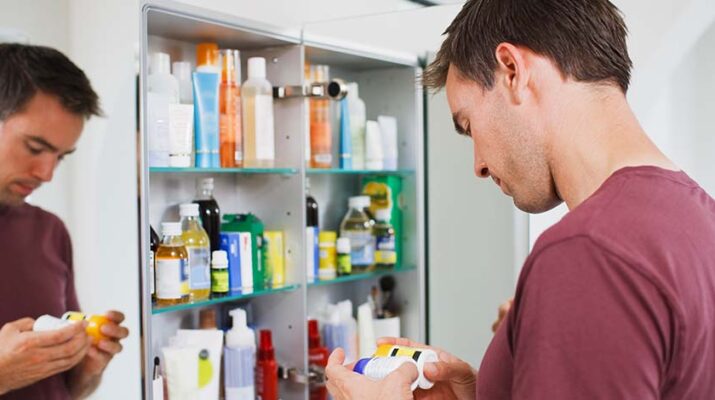By Deborah Jeanne Sergeant
Likely behind the bathroom mirror, the medicine cabinet is home to an assortment of health aids in most homes. Unfortunately, many cabinets are jammed with items that should not be there.
Some also lack a few helpful essentials.
“Get rid of unused medication, especially the controlled substances,” said Barb Madison, pharmacist and owner of Parker Pharmacy in Buffalo. “If people know you have them in your house, you don’t want them to break into your house to obtain them. You can take them to local police department. They have a bin to put them in there.”
Although you may feel your children would never take your prescriptions or over-the-counter drugs, what about the repairman, the friend-of-a-friend attending your house party or your teen’s new buddy? Some burglars ransack medicine cabinets looking for drugs to use or sell. Keeping this medication locked up and not in a likely place, like the medicine cabinet, prevents drug misuse.
The bathroom is not even a good place for storing drugs to begin with.
“The medicine cabinet, which is usually in the bathroom is not the best place to keep medicine,” said Steve Giroux, pharmacist at Middleport Family Health Center in Middleport in Niagara County. “Medications are often susceptible to humidity. Invariably, people open up a bottle over a sink and spill it. Consequently, the medicine cabinet is probably not the best place to keep medicine. Keep it in a dry, controlled place like a bureau drawer.”
It is also important to occasionally look through medication for any you no longer take. Giroux views this as a task to perform every year to get out old, superfluous and expired items.
Taking any unnecessary drugs can lead to dangerous interactions and needless side effects. It can waste money.
Many items from your local pharmacy may have expired such as over-the-counter ibuprofen, acetaminophen, aspirin, antihistamines, 1% hydrocortisone cream, antibiotic cream and cold medication. Check the packaging for their expiration dates and replace any needed with smaller containers so you won’t waste it.
“Always check expiration dates and dispose of things that are expired,” Giroux said.
Stocking huge bottles of over-the-counter medication that can expire is a bad idea since that can lead to items going bad if they’re not used up.
Look over your bandages to ensure their packaging is still intact and that your sunscreen is not out of date. Test your thermometer occasionally so you won’t have to wonder if it works right or keep a back-up instrument. Some items may begin degrading after it’s opened, such as eye drops.
While stocking up may make you feel better prepared, you must look things over periodically to ensure your health aids have not expired.
As you sort through the medicine cabinet, make sure you have a few helpful items on hand. Review the contents of the first aid kit to ensure that the contents are still used. For example, anyone who still has ipecac syrup should dispose of it, as it is no longer used as a poisoning treatment. Activated charcoal may be an advisable remedy, but call Poison Control Centers for guidance at 800-222-1222 before trying anything at home.
“A well-stocked medicine cabinet should have ibuprofen, acetaminophen, antiseptic for cuts, and bandages,” Giroux said.
In addition to these items, Barb Madison, pharmacist and owner of Parker Pharmacy in Buffalo, advises keeping topical oral pain medication for unexpected dental issues.
“This always tends to happen in the middle of the night,” she said.
She also recommends having over-the-counter COVID tests on hand. They can offer results in 15 minutes, which can help determine whether self-quarantining is needed.
For comfortably recovering from a minor illnesses at home, stock cough medicine, saline drops, throat spray, decongestant, anti-diarrheal tablets and upset stomach medication.
“Have some aloe vera gel for a burn or some kind of burn salve,” Madison added.

